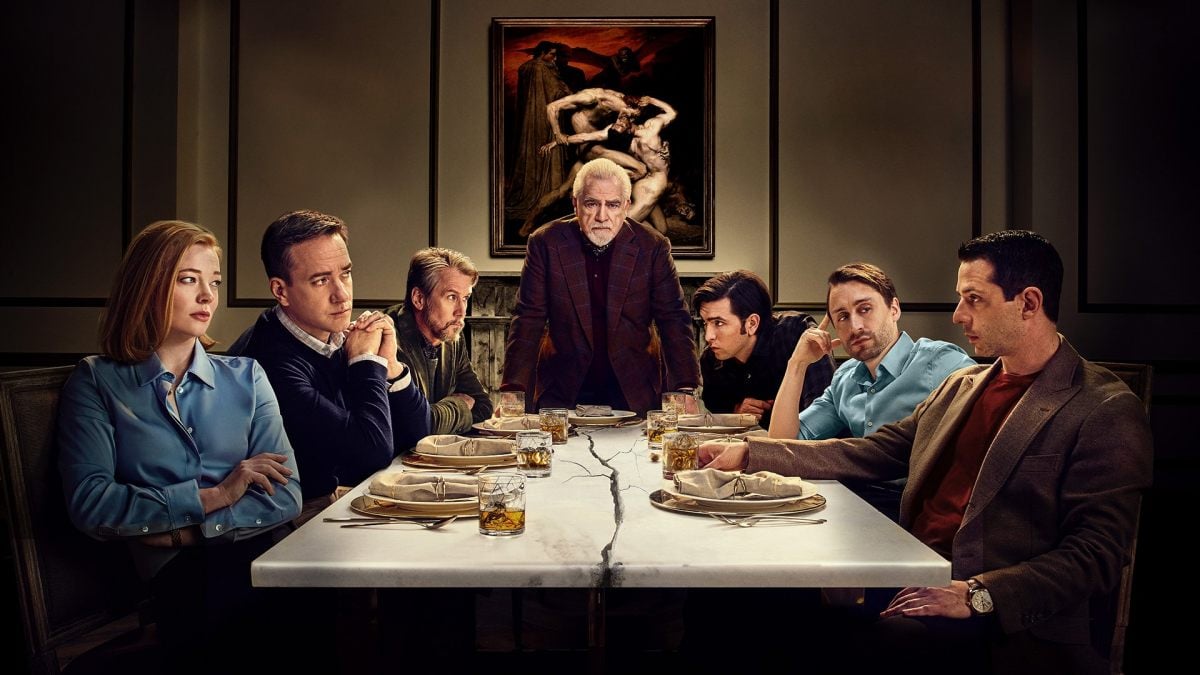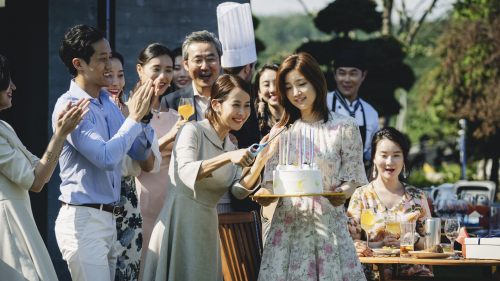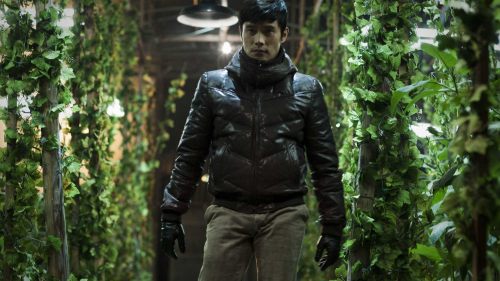The Top Ten Characters Of 2019
If you follow my reviews and film takes, you may have noticed that I’m predisposed to look at the character development and character work in a film before anything else. So in an attempt to curb the range of works I might have considered for my ten favorite this year, I decided that I would only consider the works which had characters that really spoke to me, and narrow it down from there.
Here is the list of characters that I have deemed the most interesting, well-performed, and well-written of the year. There are a couple of caveats before we begin. First, while a good performance is generally a prerequisite to earn a spot on this list, it is nowhere near the deciding factor, so don’t view this as a “Best Performances” or “Best Actors” list. Second—and this should really go without saying—if I list a character here it doesn’t mean I’m endorsing their actions or philosophy (editor's note: This is false, JM told me specifically he supports the actions of every character on this list - SW). What it does mean is that they felt so real, so revealing, and so impossibly revelatory that they threatened to pop out of the screen.
These are your chosen few:

10. Rick Dalton - Once Upon A Time In Hollywood (performance by: Leonardo DiCaprio, directed by: Quentin Tarantino)
With Rick Dalton, we get to see Tarantino write a character he never has before: an earnest, yet deeply insecure artist who’s trying to do his best work despite the wave of cynicism that’s creeping up on him from all sides. Rick Dalton is 1950s Hollywood incarnate, as perceived by Tarantino, and that comes with all the implications you might imagine.
We’re informed of Rick’s worldview not only through what he says and does in OUATIH, but also through the way Hollywood itself is presented through his eyes. The cowboys he plays on TV are reflected by the companion he’s chosen for himself. Cliff Booth is a Hawaiian shirt-wearing ronin who faces off against outlaws on Spahn Ranch, the kind of character Rick could only dream of playing.
Tarantino romanticizes Rick’s work, shooting his Lancer pilot with long takes and complicated camera moves and edits, more to resemble a modern, “prestige” program than a western show from that era. But in that way, Tarantino makes us understand exactly why someone like Rick would prefer the idealized Hollywood of the past, and makes us embrace the inherent comfort of revisionism. From there you can make your own conclusions, but it's hard to ignore how Rick's journey as TV-star-turned-Spaghetti-Western-veteran got us here in the first place.

9. Rosie - The Body Remembers When The World Broke Open (p: Violet Nelson, d: Elle-Maija Tailfeathers and Kathleen Hepburn)
You could read the logline or watch the trailer to The Body Remembers and think you know what kind of film it is but trust me when I say that this is a film that needs to be seen in order to be experienced.
The proof for this is in Rosie’s portrayal; where lesser stories would have been satisfied to just pull at your heartstrings with a sympathetic character, The Body Remembers strives to humanize Rosie as far more than just a victim. Violet Nelson deftly plays it cool while never letting us forget that Rosie is always observing. Co-directors Tailfeathers and Hepburn let us into Rosie’s point of view often enough to know that she’s in way over her head, but Nelson conveys true bravery so well that it makes you believe—if just for a second—that she’s ready to take on the world.
And before you know it, you can’t help but care.

8. Dr. Dibs - High Life (p: Juliette Binoche, d: Claire Denis)
Juliette Binoche is clearly having the time of her life playing Dibs, the space witch who’s seemingly pulling all the strings aboard the prison ship at the center of High Life. Dibs could have just been a gender-bent addition to the “mad scientists with god complexes” collection that Ex Machina and Blade Runner 2049 have contributed to in recent years. Instead, Dibs actually proves to be something much more insidious and tragic.
High Life is a film that dwells on the biological vulnerability of the human mind and body, and Dibs represents almost every single fear one could have regarding that topic. Infertile and physically incapable of achieving orgasm, Dibs feels she has been robbed of all her sexual agency, and so she robs the members of a ship of their own. But the doctor’s experimentation to conceive the first child in space isn’t sustained solely by a ruthless lack of compassion; she’s looking for an assurance that there’s something more than the void that lives both inside of her and that she has been launched into. And although Dibs’ heinous actions resulted in the daughter who became Monte’s only companion and raison d'être in his later years, the film is never so simple as to make that pursuit appear to be worth it.

7. Becky Something - Her Smell (p: Elizabeth Moss, d: Alex Ross Perry)
A lot of films get slapped with the phrase “emotional rollercoaster ride,” but I can’t think of a more appropriate use for it than Becky Something’s journey in Her Smell. Captured entirely in long takes and claustrophobic close-ups, Becky is a character whose nerve-wracking hysteria is truly contagious. Alex Ross Perry and Elizabeth Moss reel you in with the visceral thrill of Her Smell’s first three acts, before opening up into a fourth and fifth act that’s one of the most cathartic portrayals of recovery ever put to screen.
We learn some things about Rebecca Adamcyzk (that is, the girl who Becky Something used to be before she became a rock star) through the videotape footage spliced between the five main “scenes” of Her Smell. But we learn the most about Rebecca through her own poetry, whether it comes in the form of lyrics or as the aggressive monologues she bombards the people near her with. Moss is really doing it all as Becky, having to deliver iambic pentameter soliloquies as abrasive screeds. It all goes in service of painting the most evocative and complex musician character in recent memory, and it says a lot that Becky is entirely fictional.

6. Billy "Blackbird" Mangana - The Nightingale (p. Baykali Ganambarr, d: Jennifer Kent)
Jennifer Kent pulled off a bit of a feint with The Nightingale when she drew audiences in with the hook of a white woman’s rape-revenge set hundreds of years ago and instead served a rumination on colonial violence that reverberates to this very day.
No character better articulates the thesis of The Nightingale than Billy Mangana, the Aboriginal Tasmanian who is involuntarily drafted into Clare’s hunt for vengeance. Billy calls out Clare for her recklessness and her racism, and it's endearing to watch him undermine his European colonizers in his own clever ways. But at the heart of the character is a bottomless grief and rage over an amount of loss no human should ever be expected to go through and still come out of on the other end. Yet Billy—through his experiences adventuring with Clare, through his singing as “the Blackbird”, and his renewed connection to his heritage—actually manages to.

5. Red - Us (p: Lupita Nyong’o, d: Jordan Peele)
I’ve written before about how Us’ the Tethered are the most appropriate movie monster for our current era, and as the year closes out I feel just as confident in my appraisal. Twice now, Jordan Peele has created a horror entity that people now use in daily parlance, and the most recent of those entities has a face and a performance to go with it.
How could I not give Red a nod? It’s not only Lupita Nyong’o firing on all cylinders in her long-due first main role in a film, but it’s also a character that quietly demands attention every time she’s on-screen. On the one hand, Red is imposter syndrome come to terrifying life. But Red is also a human being, dealing with the trauma of being contorted into something below that, and her dance is like the painful joint reset that comes with reasserting your own personhood. Viva la Tethered! Viva Red!

4. Kim Ki-jeong - Parasite (p: Park So-dam, d: Bong Joon-ho)
It’s not like I’m giving Ki-jeong a spot on this list just because she’s the source of the “Jessica, Only Child, Illinois, Chicago” meme (although the fact she is doesn’t hurt.) If Red from Us represents the boiling vengeance of an underworld that’s been left behind, then Parasite’s Ki-jeong personifies the impulse that begets such a retaliation: the elegant allure of scamming one’s way to the surface world and never looking back.
While it’s true that—among the cast of Parasite—Ki-woo is the protagonist who gets the film’s central plot moving and has the final word, and Song Kang-ho’s Ki-Taek is the de facto leader of the Kim clan, the film’s infiltration narrative soars when we see Ki-jeong effortlessly take on the role of the Parks’ art tutor, and continue to thrive from that moment on.
Ki-jeong is charismatic, largely because Park So-dam was given great deadpan comedic material and ran with it, but she’s also sinister because of the ease with which she embraces zero-sum capitalism. Unlike her family members, we never get a piece of dialogue that unambiguously sheds light on Ki-jeong’s moral philosophy. The closest thing we get is the visual of her nonchalantly smoking on the toilet as she tries to prevent it from overflowing with all the shit it’s full of. Thank you, Bong, for creating the most perfect summation of hustle culture.

3. Howard Ratner - Uncut Gems (p: Adam Sandler, d: Josh and Benny Safdie)
The specificity of Howard Ratner makes him impossible not to appreciate. Everything from his belt buckle to his front row of teeth was meticulously chosen because, as the Safdies will readily admit, “God is in the details.” Out of that ethos comes some of the most colorfully drawn characters you’ll find this side of Italian neo-realism, and Howie Bling is no exception.
Living in New York, I’ve often wondered what kind of person would not only tolerate but thrive within the hustle of Manhattan’s Diamond District, and while the Safdie Brothers haven’t come up with the only answer, they’ve definitely given us the most entertaining one. When Uncut Gems begins, it’s already after Howard has made some of the most pivotal decisions in the story, and the film is like a series of golden Furbies coming home to roost. There isn’t a ton of room for growth, but what makes Howard compelling comes exactly from the fact that he’s an unrepentant fiend. You’ll watch Gems praying for Howard to have an epiphany that never comes, and if that’s not an honest simulation of dealing with toxic people in real-life, I don’t know what is.

2. Frank Sheeran - The Irishman (p: Robert De Niro, d: Martin Scorsese)
Where can I begin with Frank? With the fact that one of our New Hollywood living legends managed to pull off one of the finest performances of his career while being lathered CGI de-aging technology? With the part where Scorsese used a simple mob enforcer to expose us to the uncaring and ceaseless march of time, like a morbidly honest Forrest Gump?
Maybe I’ll start with where Frank Sheeran’s story ends in the movie, with him speaking to the priest in his nursing home about his life’s regrets. Well, Frank being the ironclad tough guy that he is, he doesn’t confess to the murders he committed while working for the Bufalino crime family, not even to the murder of his closest friend. He’s speaking around the priest more than he is to the priest.
But there’s a small moment of sincerity where he can’t help but speak aloud “What kind of man makes a phone call like that?” and that’s when the weight of it all just explodes out of the screen. Not literally, since De Niro is still maintaining Frank’s repressed and aloof composure. All it takes is that one line, the quavering of his chin, and his short stutter when he says “phone call” and suddenly thirty years of guilt and remorse become painfully etched in his face, and remain there until the film is over.
Frank Sheeran, as portrayed in Martin Scorsese’s The Irishman, lived his life as a soldier, but he never truly left that ditch where he forced the Germans to dig their graves at gunpoint. I think it’s because Frank always felt he was at gunpoint too, and if he just did a good job, then the guy with the gun would change his mind. But after a lifetime of putting other men in graves, Frank still has to stare down the barrel of his mortality, and even he can’t overlook how he has nothing to show for it.

(Tie) 1. Marta Cabrera - Knives Out (p: Ana de Armas, d: Rian Johnson)
Like the Thrombey estate itself, there is an embarrassment of riches when it comes to picking a favorite character from Knives Out. Should I pick Daniel Craig’s instantly iconic Benoit Blanc? Chris Evan’s gleeful turn as the wickedly charming Ransom Drysdale? Toni Collette’s opportunistic and hilariously vapid influencer Joni? Or what about Christopher Plummer’s Lear-like patriarch Harlan, whose regretful reflections rival Frank Sheeran’s in their sadness?
But among all of these characters, the one I kept coming back to was Marta Cabrera. Not simply because of the film’s endearing mechanism which forces her to be the only honest character in a cast full of liars, but also because that innate honesty forces her to become a fighter. Which she does! Marta fights in the way nobody in film and few in the audience would expect she would, and that’s by putting others before herself without compromising her core values. Is it a fantasy that a person could live this way and still give us the most fist-pump inducing final shot of the year? Sure, but the beauty of Marta is that she’s a figure worth rallying around, and we should aspire to be her as much as we do superheroes and Jedi.

(Tie) 1. The Roy family – Succession (performances by: ensemble, created by: Jesse Armstrong)
2019 gave us many different outlets to satirize rich assholes, and no truer was that than with the trifecta of Parasite, Knives Out, and HBO’s Succession. I knew my list had to include Parasite—because Parasite—but I was at an impasse when it came to the latter two. Knives Out provides a schadenfreude-inducing collection of bickering socialites as well as a hero capable of vanquishing them, meanwhile Succession is far more concerned with showing us the world as it exists. In the end, I felt like it wouldn’t be appropriate to award one without awarding the other, so here you have Marta Cabrera and her diametric opposites, the Roy family, all tied as the best characters of 2019.
It can’t be overstated how jaw-dropping it is that Succession manages to make you empathize with the greedy, ostentatious media mogul house of Logan Roy without sanding off their sharper edges, or endearing you to how remorseless they can be. Succession is a tried and true tragedy, where there’s nobody really wins, and if they do, it’s with a lot of sacrifice and it doesn’t stay for long. This shouldn’t obscure the fact the show is also raucously funny, and the cast is routinely asked to balance their comedic and dramatic chops with every passing story beat.
It’s absolutely remarkable what’s being pulled off in Succession, and I’m sad to say the Roys have been living in my head since I watched the show months ago.



